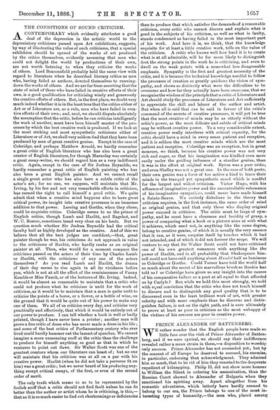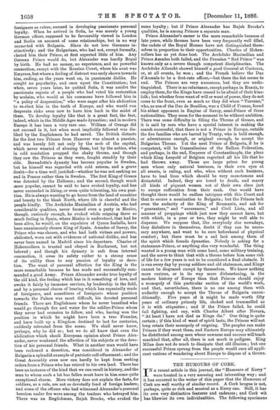PRINCE ALEXANDER OF BATTENBERG.
WE rather wonder that the English people have made so little fuss over the visit of Prince Alexander of Batten- berg, and if we were cynical, we should say their indifference revealed rather a mean strain in them,—a disposition to worship only success. Prince Alexander has not succeeded yet ; but by the consent of all Europe he deserved to succeed, his enemies, in particular, endorsing that acknowledgment. They admired him so much, that to be rid of him they resorted to the desperate expedient of kidnapping. Philip IL did not show more honour to William the Silent in ordering his assassination, than the Russian Court showed to Alexander of Bulgaria when they sanctioned his spiriting away. Apart altogether from his romantic adventures, which latterly have hardly seemed to belong to our era, the Prince belongs to one of the most in- teresting types of humanity,—the men who, placed among
foreigners as rulers, succeed in developing passionate personal loyalty. When he arrived in Sofia, he was merely a young German officer, supposed to be favourably viewed in London and Berlin on account of some relationships, but in no way oonnected with Bulgaria. Slays do not love Germans in- stinctively; and the Bulgarians, who had not, except formally, elected him their Prince, at first expected little of him. Any German Prince would do, but Alexander was hardly Royal by birth. He had no money, no experience, and no powerful connection, except with the Russian Court, where his aunt was Empress, but where a feeling of distrust was early shown towards him, ending, as the years went on, in passionate dislike. He sought no popularity, and once upset the Constitution; but when, seven years later, he quitted Sofia, it was amidst the passionate regrets of a people who had voted his restoration by acclaim, who would at his summons have followed him in "f a policy of desperation," who were eager after his abdication to re-elect him in the teeth of Europe, and who would run desperate risks even now to have him back in the midst of them. To develop loyalty like that is a great feat, the feat, indeed, which in the Middle Ages made dynasties; and in modern Europe it has been a very rare one. William of Orange did not succeed in it, but when most implicitly followed was dis- liked by the Englishmen he had saved. The British distaste for the first two Princes from Hanover was almost a passion, and was keenly felt not only by the mob of the capital, which never wearied of abusing them, but by the nobles, who in cold resolution propped the shaky throne, and though they saw the Princes as they were, fought steadily by their side. Bernadotte's dynasty has become popular in Sweden, but he himself was regarded with cold esteem, and a grave doubt—for a time well justified—whether he was not seeking an end in France rather than in Sweden. The first King of Greece was detested by the Hellenes; and the second, though much more popular, cannot be said to have evoked loyalty, and has never succeeded in liking, or even quite tolerating, his own posi- tion. He is always wanting to go home from the land of sunshine and beauty to the bleak North, where life is cheerful and the people kindly. The Archduke Maximilian of Austria, who had considerable qualities, never formed even a party in Mexico, though, curiously enough, he evoked while reigning there so much feeling in Spain, where Mexico is understood, that had he been alive, he would, on the expulsion of Queen Isabella, have been unanimously chosen King of Spain. Amadeo of Savoy, the Prince who was chosen, and who had both virtues and powers, abdicated, worn out with evidences of national dislike, and has never been named in Madrid since his departure. Charles of Hohenzollern is trusted and obeyed in Bucharest, but not beloved ; and though his dynasty is safe from internal commotion, it owes its safety rather to a strong sense of its utility than to any passion of loyalty or devo- tion. The want of personal affection for the King is the more remarkable because he has made and successfully com- manded a good Army. Prince Alexander awoke true loyalty of the old kind, the feeling which has in it something of love, and awoke it fairly by immense services, by leadership in the field, and by a personal charm of bearing which has repeatedly made of foreigners, and sometimes of foreigners whose position towards the Palace was most difficult, his devoted personal friends. There are Englishmen whom he never benefited who would go through fire and water for the soldier-Prince whom they never had occasion to follow, and who, having won the position in which he might have been a true Founder, and have Wit up a Kingdom destined to last for centuries, suddenly retreated from the scene. We shall never know, perhaps, why he did so; but we do all know that even the abdication which shook European opinion about Prince Alex- ander, never weakened the affection of his subjects or the devo- tion of his personal friends. What in another man would have been reckoned a desertion, was considered in Alexander of Bulgaria a splendid example of patriotic sell-effacement; and the Great Assembly even now can hardly be kept from seeking orders from a Prince who has retired to his own land. There has been no instance of the kind that we can recall in history, and the man to whom such a lot has fallen must have in him some quite exceptional charm. Mere victory does not explain the facts, for soldiers, as a rule, are not so devotedly fond of foreign leaders; and some of the officers who had witnessed Alexander's personal heroism under fire were among the traitors who betrayed him. There was an Englishman, Rajah Brooke, who evoked the same loyalty ; but if Prince Alexander has Rajah Brooke's qualities, he is among Princes a separate man.
Prince Alexander's career is the more remarkable because of late years, while thrones have been very frequently well filled, the cadets of the Royal Houses have not distinguished them. selves in proportion to their opportunities. Charles of Hohen- zollern has as yet done best. The Archduke Maximilian and Prince Amadeo both failed, and the Prussian "Red Prince" was known only as a severe though competent disciplinarian. The Archduke Albrecht showed himself a good General at Castozza, or, at all events, he won ; and the French believe the Due d'Aumale to be a first-rate officer,—bat there the list seems to end. The Princes are very numerous, but they are undis- tinguished. There is no reluctance, except perhaps in Russia, to employ them, for the Kings have ceased to be afraid of their kins- folk ; but whether from want of will or want of power, they do not come to the front, even as much as they did when " Turenne," who, as eon of the Due de Bouillon, was a Child of France, found his ablest opponent in Eugene of Savoy, semi-Prince of three nationalities. They seem for the moment to be without ambition. There was some difficulty in filling the Throne of Greece, and it is said by men who have a special interest in making the search successful, that there is not a Prince in Europe, outside the five families who are barred by Treaty, who is bold enough, or adventurous enough, or original enough, to accept the Bulgarian Throne. Yet the next Prince of Bulgaria, if he is competent, will be Generalissimo of the Balkan Federation, and perhaps, in the end, Emperor of Constantinople, the place which King Leopold of Belgium regretted all his life that he had thrown away. Those are large prizes for young men whose only natural business, in their own eyes at all events, is ruling, and who, when without such business, have to lead lives which should be very monotonous and distasteful. Indeed, they are bored to death, and marry all kinds of piquant women not of their own class just to escape suffocation from their rank. One would have thought there would be endless intrigues with this Court and that to secure a nomination to Bulgaria; but the Princes lack even the audacity of the King of Roumania, and ask for "guarantees," and "assurances," and Civil Lists, and all manner of proppings which just now they cannot have, but with which, in a year or two, they might be well able to dispense. We suppose that, like everybody else nowadays, they disbelieve in themselves, doubt if they can be neces- sary anywhere, and want to be sure beforehand of physical comfort ; but there must be a sad lack among them of the spirit which founds dynasties. Nobody is asking for a statesman-Prince, or anything else very wonderful. The thing wanted is a young man with some head, some military training, and the nerve to think that with a throne before him some risk of life for a few years is not to be considered a final obstacle. It is run every day by young soldiers and old statesmen, and Kings cannot be disgraced except by themselves. We know nothing more curious, or in its way more disheartening, in the modern history of Europe than that Princes should enjoy a monopoly of this particular section of the world's work, and that, nevertheless, there is no one among them with audacity enough to accept the Throne of Bulgaria uncon- ditionally. Five years of it might be made worth fifty years of ordinary princely life, choked and trammelled as it is with etiquettes ; and if the Prince failed, he could fail fighting, and say, with Charles Albert after Novara, "At least I have not died as Kings die." One thing is quite certain ; if this kind of want of spirit lasts, the Princes will not long retain their monopoly of reigning. The peoples can make Princes if they want them, and Eastern Europe may ultimately be distributed among men whose newness and success will teach mankind that, after all, there is not much in pedigree. King Milan does not do much to dissipate that old illusion ; but one successful Prince sprung from the people would cure all appli- cant nations of wandering about Europe to dispose of a throne.

















































 Previous page
Previous page